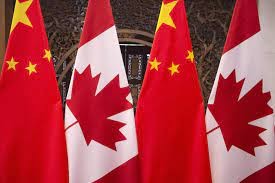
By RENA LI in Toronto
Canada should reconsider its approach toward China because while it is reaping the benefits of trade with the Asian nation, it allows its deference to the United States to undermine the relationship, according to an international affairs expert.
“So, on one hand, we have an empirical reality that suggests that we have a workable, functional, economic relationship with China. On the other hand, we have a security agenda that’s suggested (that) under no circumstances should we not only not trust China, we shouldn’t even be working with them; we should be de-linking from their economy; we should treat them as a security threat,” said David Carment, a professor at Carleton University’s Norman Paterson School of International Affairs.
“We cannot rely solely on experts who clearly have hidden agendas. The best bet for Canada is to hedge their bets (and) play both sides,” said Carment, who spoke at a recent webinar on Canada-China relations held by the Institute for Peace & Diplomacy.
“We need to understand how we can advance our economic interest while not allowing the security discourse dominate and skew our foreign policy choices into avenues that are ultimately counterproductive,” he said.
Since Canada arrested Huawei Technologies executive Meng Wanzhou on behalf of the United States in December 2018, it has been caught between two superpowers and is absorbing the punishment.
“Canada’s stuck between partisan politics on the one hand and pursuing interest-based foreign policy on the other,” he said.
“What we have is essentially a vacuum of leadership regarding very similar issues. It’s being dominated by groups who clearly see that there’s some advantage in securitizing our foreign policy vis-à-vis China,” said Carment. “So now we have to contemplate whether we wish to support the US in its efforts to contain China and de-link from the Chinese economy. And there are a number of reasons why that’s problematic and not in Canadian interests.”
Historically, Canada has always been interested in trade diversification, Carment said. It’s been a stated goal of all Canadian governments that have basically tried to engage a globalized economy from the 1970s onward.
There also is a desire to reduce dependence on the US. That strategy would help ensure that Canada would not get intertwined in disputes with more powerful countries at its own expense, according to Carment.
Canada’s current relations with China can really only be interpreted through the lens of the United States, he said.
“We’ve seen an example of that through the arrest of Meng Wanzhou,” said Carment. “Whether you agree or not, her detention is related to American efforts to weaken technological capacity with China. … If you look at the larger geopolitical problems that the US faces from China, it is deeply concerned about reliance on Chinese technology.”
In the last quarter of 2020, Canada saw its exports to China increase, where there was an actual net gain in trade despite the COVID-19 pandemic. Meanwhile, Canada’s trade with the US diminished in part because of the closure of its border due to the outbreak.
China Daily Global
 Africa -China Review Africa -China Cooperation and Transformation
Africa -China Review Africa -China Cooperation and Transformation
